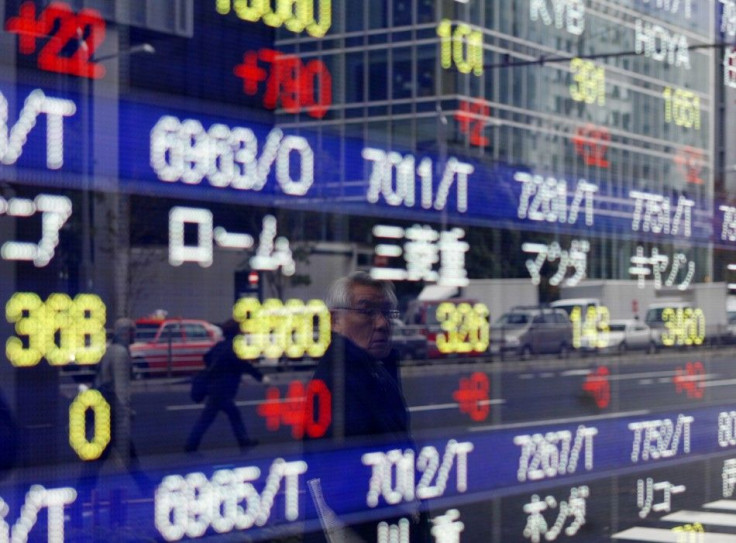Nikkei, Asia Markets Close Higher Tuesday on Alcoa Earnings

(Reuters) - The Nikkei share average edged up on Tuesday after revenue at U.S. aluminum giant Alcoa beat expectations, while Olympus jumped 20 percent on reports it would remain listed, but the benchmark remained stuck below key resistance ahead of events in Europe.
Tokyo Electric Power Co surged more than 24 percent after a report that its main lenders will begin talks this week to lend an additional 1 trillion yen ($13 billion) to the troubled utility.
Market participants said the Nikkei would stay rangebound in thin trade ahead of a Spanish debt auction and a European Central Bank policy meeting on Thursday, and an Italian bond sale on Friday.
German and French leaders warned Greece on Monday that the debt-stricken country would get no more bailout funds until it agrees with creditor banks on a bond swap, reigniting fears of a Greek default and hurting financial stocks in Europe and the United States.
It's as if the market has a bone stuck in its throat and it's difficult to move in either direction, said Fumiyuki Nakanishi, general manager of investment research at SMBC Friend Securities.
The Nikkei gained 0.4 percent to 8,422.26, its first rise in three sessions, but remained below its 25-day moving
average around 8,500.
The benchmark has largely kept to a narrow range of 8,350 to 8,500 since mid-December, but market particpants said steady performance of bluechips on Tokyo's Core 30 listindicated that the market was unlikely to fall much further.
The broader Topix climbed 0.3 percent to 731.93.
Alcoa's positive outlook for global aluminium demand helped boost S&P 500 stocks 0.2 percent, and MSCI's broadest
index of Asia Pacific shares outside Japan climbed 1.7 percent.
EUROPEAN EXPOSURE
But market participants said investors will remain risk averse as they wait for earnings of U.S. financial firms with high exposure to Europe.
With so much uncertainty from Europe in the short-term, investors are unable to take on risk and there's no-one buying except for short-covering, said Yutaka Miura, senior technical analyst at Mizuho Securities.
Indeed, Europe-sensitive stocks fell broadly on Tuesday,fter the euro marked a new 16-month low against the dollar the previous day and stayed near an 11-year low against the yen hit overnight.
Mazda Motor fell 2.2 percent to 131 yen, Daikin Industries shed 2.2 percent to 2,005 yen and Konica Minolta Holdings slid 4.2 percent to 543 yen.
But Olympus Corp jumped 19.9 percent to 1,263 yen, becoming the third-heaviest traded stock by turnover on the main board, although the Tokyo bourse said no decision has been made on its listing.
The maker of cameras and endoscopes also said on Tuesday it was suing current and former executives over the $1.7 billion accounting scandal engulfing the firm.
Traders who had oversold after (former CEO Michael) Woodford dropped out of the proxy fight last week are just
buying in on reports that the bourse will keep the stock listed, said Masayoshi Okamoto, head of dealing at Jujiya Securities.
Tokyo Electric, the operator of the crippled Fukushima nuclear plant, ended the day up 24.3 percent at 215 yen and
topped the main board as the heaviest traded share by turnover.
The Nikkei newspaper said on Tuesday that the utility's main lenders will decide on conditions to lend additional funds at the government's request.
Trading volume was moderate on Tuesday, with 1.66 billion shares changing hands on the main board, up from 1.54 billion shares on Friday.
Meanwhile, other southeast Asian stock markets pushed higher on Tuesday as a strong oil market
attracted broad-based buying in commodities-related stocks and volume picked up, although continuing concern over euro zone sovereign debt kept foreign inflows in check.
Philippine shares ended up 0.4 percent, hitting an all-time high at one point, while Indonesia gained 1.3 percent and Thailand rose 0.8 percent, both around four-month highs.
Vietnam climbed 1.6 percent and Singapore rose 1.1 percent after Monday's 0.9 percent fall but Malaysia was flat.
The Malaysian bourse said domestic institutions bought shares worth a net 35 million ringgit ($11 million) and foreign investors bought 7.4 million ringgit ($2.35 million).
Foreign investors bought Philippine shares worth $21 million and sold Thai shares worth a net 1.8 billion baht ($56.68 million), Thomson Reuters and stock exchange data showed.
Garry Evans, HSBC's Global Head of Equity Strategy, was cautious on Southeast Asia, rating Indonesia and Malaysia as neutral, the Philippines and Thailand as underweight and Singapore as the only overweight market.
ASEAN is a bit over-owned and it's not particularly cheap so it's really thin in the category of good value, Evans told a briefing in Singapore.
In Manila, Metropolitan Bank and Trust Co rose 0.7 percent after Monday's 4.6 percent surge as lower Philippine
inflation for December bolstered hopes of a possible rate cut by the central bank this month.
Sentiment towards commodities-related shares was resilient as oil rose towards $113 a barrel on Tuesday. Among actively traded shares, Thai energy explorer PTT Exploration and
Production Pcl gained 1.1 percent.
Indonesian coal firm PT Adaro Energy Tbk rose 2.2 percent and Malaysia's Petronas Chemicals Group Bhd
was up 0.5 percent.
(Additional reporting by Viparat Jantraprap and Kevin Lim in Singapore.)
© Copyright Thomson Reuters {{Year}}. All rights reserved.





















